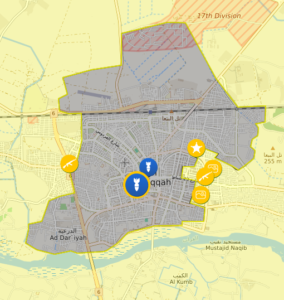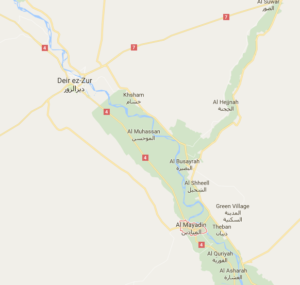The coalition of forces fighting the Islamic State continue to make steady advances on a number of fronts:


Under President Obama, U.S. Army Special Forces assigned to Syrian Democratic Forces needed special approval from Washington for virtually all tactical moves amid the politically complex theater of Americans, Arabs, Kurds, Turks and Syrians.
In Tabqa, where the city, its dam and its airfield were the objectives, the Green Berets decided they needed an airlift. Suddenly minus red tape, Arabs, Kurds and Americans were helicoptering into battle, and they quickly seized territory.
Under Mr. Obama, Islamic State terrorists could at times retreat from towns, immune from airstrikes if they used civilians as cover. The battle for Manbij in August became infamous when the SDF let 200 Islamic State fighters turn in their weapons and escape because they had threatened to kill town residents if they were not allowed to run away.
The new Trump strategy calls for surrounding towns, as opposed to pushing from one end or one side to another, in order to isolate Islamic State fighters and annihilate them.
Brett H. McGurk, special U.S. envoy to the coalition against the Islamic State who performed the same role for Mr. Obama, talked of “the delegations of authority which has made a difference in terms of the speed of execution. I think Tabqa was an example of that.”
“Our military people on the ground saw an opportunity to kind of surprise ISIS with a helicopter, moving them by helicopter, surprise them from behind and seize the airport, the dam and the town,” Mr. McGurk later told reporters at the Pentagon.
After Tabqa’s liberation, Mr. McGurk spoke to the city’s mayor, who gave a brief description of the war of annihilation.
“He also said he believes that most of these foreign fighters are now dead,” the diplomat said.
Mr. Mattis said: “No longer will we have slowed decision cycles because Washington, D.C., has to authorize tactical movements. I’ll leave that to the generals who know how to do those kind of things. We don’t direct that from here. They know our intent is the foreign fighters do not get out. I leave it to their skill, their cunning, to carry that out.”
House-by-house clearing in Raqqa:
The ruins of the Al Nuri Mosque in Mosul, from which al-Baghdadi declared his short-lived caliphate:
The Islamic State is by no means destroyed, but they’re definitely on the ropes. The defeat of the Islamic State won’t end transnational Islamic fundamentalism, but it will certainly take the wind out of their sails.
Not included in this roundup: Groups outside Islamic State territory that pledged allegiance to the Islamic State. I hope to have a separate roundup on them Real Soon Now.
Note: Post updated to remove embedded video on improvised weapons of the Battle for Mosul, as it’s been taken down for “violating YouTube’s Terms of Service,” possibly because it included Islamic State propaganda videos of weapon-making among the footage.